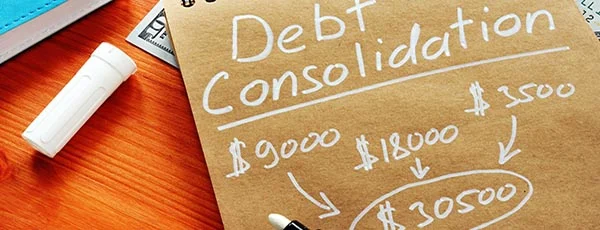Pros and Cons of Debt Consolidation

ByPeter Warden
UpdatedJan 10, 2026
- Debt consolidation can be an effective strategy to pay off debt faster.
- Debt consolidation means replacing multiple debts with a single monthly payment.
- Debt consolidation does not “wipe out” your debt. It restructures it to reduce your monthly payment and/or your interest rate.
Table of Contents
Debt consolidation is a popular debt reduction strategy that can be effective – or it can leave you worse off than before. You can improve your odds of success if you understand the pros and cons of debt consolidation.
Debt Consolidation Pros
Your debt consolidation's benefits can be enormous, and its drawbacks zero. But only if you use the process wisely. Those benefits often include:
Benefits of debt consolidation
Combining your debt can feel like a big step, and the move can be significantly beneficial. Let’s walk through the key advantages of debt consolidation.
Lower interest rate
One benefit of debt consolidation is the possibility of a lower interest rate. If you have high-interest credit cards, moving their balances to a consolidation loan with a lower rate could save you money. You may be able to pay less in interest and put more money towards paying off your actual debt.
Easier money management
Debt consolidation allows you to simplify your finances. Instead of keeping track of several due dates, you’ll have just one payment to focus on. This can make a huge difference in staying organized and on top of your finances, especially if you set up automatic payments.
Lower monthly payment
Merging loans can lead to a lower monthly payment and more breathing room in your budget. If your new loan has a lower rate or spreads payments out over a longer period of time, your monthly outlay could drop. This can free up funds for other essentials or savings goals. Just remember that extending your loan term can mean paying more in interest over time.
Higher credit score
Consolidating your debt can boost your credit score because when you pay off credit card balances, your credit utilization ratio improves. This means you’re using less of your available credit, which can give your score a bump. As your score improves, you might find it easier to get better loan rates—and lower rates can save you even more money.
Debt Consolidation Cons
By far the biggest pitfalls in debt consolidation occur when people run up debt again. It's easy to do.
When you consolidate, it can feel like an enormous load has been lifted from your shoulders. And, suddenly, you have credit and store cards with zero balances. What's the harm in indulging yourself with an occasional treat?
There may be no harm in that. But it rarely ends there because people forget that debt consolidation doesn’t magically wipe out their debts. It merely reorganizes them. This is a slippery slope with a disaster waiting at the bottom. And all too many people who consolidate their debts careen down that slope.
Debt Consolidation the Right Way
The first thing to recognize is after debt consolidation, you still owe the money. Perhaps even more if there are loan fees involved. Understand that debt consolidation is not some routine financial tool that everyone uses from time to time. It's a huge red flag warning you that your finances are out of control. And it's an opportunity to take back that control.
Federal regulator the Consumer Financial Protection Bureau (CFPB) recommends a three-step approach before you begin to consolidate. Here, word for word, is what its website says:
Take a look at your spending. It's important to understand why you are in debt. If you have accrued a lot of debt because you are spending more than you are earning, a debt consolidation loan probably won't help you get out of debt unless you reduce your spending or increase your income.
Make a budget. Figure out if you can pay off your existing debt by adjusting the way you spend for a period of time.
Try reaching out to your individual creditors to see if they will agree to lower your payments. Some creditors might be willing to accept lower minimum monthly payments, waive certain fees, reduce your interest rate, or change your monthly due date to match up better to when you get paid, to help you pay back your debt.
That first CFPB point is crucial. Of course, you may be struggling financially because you've been sick or unemployed or have faced some exceptional bills. That's less of an issue.
Budgeting
But, if you're simply spending more than you earn to prop up your lifestyle, that's unsustainable. And, eventually, you're inevitably going to run out of road.
So move on to the CFPB's second point and make a budget. Yes, it's boring and can be hard work. But making one (and sticking to it) may be your only way to move forward so that you control your money rather than the other way round.
How to decide if you should consolidate your debt
To decide whether debt consolidation makes sense for you, take the following steps.
Assess your debt level
First, take a close look at your total debt. If you face high interest rates and juggle multiple payments, consolidation might help.
Compare interest rates
Next, compare the interest rates of your current debts. Compare them with the rate of a consolidation loan. If the new rate is significantly lower, you’ll save money over time, making consolidation a smart move.
Evaluate your credit score
Your credit score plays a role in the rate you’ll receive from a lender. If your score has improved since you took on your original debts, you might qualify for better rates now.
Consider your monthly budget
Review your budget and consider whether you can comfortably afford the new consolidated payment. Consolidation often lowers monthly payments, but you’ll want to make sure.
Review long-term financial goals
Think about your long-term financial goals. If you prioritize being debt-free, consolidation might get you there faster. If you have other financial goals that are high priority, make sure debt consolidation would align with your plan to reach those milestones.
Understand the costs
Be aware of any fees for the consolidation loan including origination fees or prepayment penalties. Make sure the benefits of consolidating outweigh these costs.
Explore alternatives
Before making a final decision, explore other debt relief options. Sometimes, a debt management plan or negotiating with creditors can also provide relief. Find the best fit for your situation.
Get professional advice
Finally, don’t hesitate to seek professional advice. A debt expert can offer personalized guidance, help you weigh the pros and cons, and decide if debt consolidation fits your goals.
Remember, you’re not alone in this. Taking these steps can help set you on a path to financial freedom.
Debt Consolidation Failure: What Are Your Options?
What happens if you've careened down that slippery slope we mentioned earlier? In other words, you tried debt consolidation and then blew it by building up yet more debt.
Well, the obvious choice is to turn to a debt management plan. But what if that, too, didn't work out? Perhaps your circumstances changed so you couldn't stick to the plan.
If you can’t afford to repay your debt, you’re typically left with only two choices:
Debt settlement – You or a debt settlement specialist negotiate with your creditors to settle your debts for less than you owe.
Personal bankruptcy – Most of us see that as a last resort. But, if you've run out of options, it can provide welcome relief from the grind and stress of managing unmanageable debt.
Many see debt settlement as the preferable alternative. And it can certainly work well. But there are some downsides – first, no company is required to negotiate with you or settle for less. Your creditors could decide to sue you if they think you can afford to repay them. Second, forgiven amounts could be taxable if the IRS doesn’t consider you insolvent.
If you choose debt settlement, take care in choosing your debt settlement specialist. Disreputable companies are in the minority, but they exist. Never pay any debt settlement provider a fee unless it arranges a settlement that you approve and want to pursue. Reputable companies will never ask for payment before settling a debt.
How do you know who's trustworthy and who isn't? The CFPB suggests that you contact your state Attorney General and local consumer protection agency. You can also read about other consumers’ experiences by checking out review sites like TrustPilot or the Better Business Bureau.
Debt relief by the numbers
We looked at a sample of data from Freedom Debt Relief of people seeking credit card debt relief during December 2025. This data reveals the diversity of individuals seeking help and provides insights into some of their key characteristics.
Debt relief seekers: A quick look at credit cards and FICO scores
Credit card usage varies significantly across different age groups, reflecting diverse financial needs and habits.
In December 2025, the average FICO score for people seeking debt relief programs was 593.
Here's a snapshot by age group among debt relief seekers:
| Age group | Average FICO 9 credit score | Average Credit Utilization |
|---|---|---|
| 18-25 | 582 | 82% |
| 26-35 | 584 | 78% |
| 35-50 | 588 | 77% |
| 51-65 | 590 | 75% |
| Over 65 | 607 | 68% |
| All | 593 | 74% |
Use this data to evaluate your own credit habits, set financial goals, and ensure a balanced approach to managing credit throughout your life.
Personal loan balances – average debt by selected states
Personal loans are one type of installment loans. Generally you borrow at a fixed rate with a fixed monthly payment.
In December 2025, 44% of the debt relief seekers had a personal loan. The average personal loan was $10,718, and the average monthly payment was $362.
Here's a quick look at the top five states by average personal loan balance.
| State | % with personal loan | Avg personal loan balance | Average personal loan original amount | Avg personal loan monthly payment |
|---|---|---|---|---|
| Massachusetts | 42% | $14,653 | $21,431 | $474 |
| Connecticut | 44% | $13,546 | $21,163 | $475 |
| New York | 37% | $13,499 | $20,464 | $447 |
| New Hampshire | 49% | $13,206 | $18,625 | $410 |
| Minnesota | 44% | $12,944 | $18,836 | $470 |
Personal loans are an important financial tool. You can use them for debt consolidation. You can also use them to make large purchases, do home improvements, or for other purposes.
Support for a Brighter Future
No matter your age, FICO score, or debt level, seeking debt relief can provide the support you need. Take control of your financial future by taking the first step today.
Show source
Author Information

Written by
Peter Warden
Peter Warden has been writing about personal finance for nearly 15 years. He’s an editor for The Mortgage Reports and a regular contributor to many major money sites. His work is often quoted or syndicated by newspapers and online.


